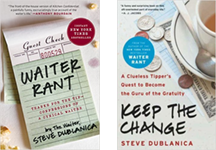It was Sunday night and my wife and I were having cocktails at Musso and Frank Grill on Hollywood Boulevard. Using the mirror behind the bar, I watched an older man putting the moves on a twentyish platinum blonde in a tight red dress who reminded me of Jean Harlow. Even though her suitor wore a watch that cost more than my car, Jean’s body language telegraphed disinterest. L.A. is a young person’s town and I doubted this guy made the chronological cut. Then again, neither did I.
Sipping our Sidecars and Pisco Sours, I watched the man’s face settle into tired resignation as he realized he wasn’t going to see this girl naked. As my cocktail worked its magic the poem “The Naked and the Nude” popped into my head. I couldn’t quite remember how the poet differentiated between two words that, at first glance, mean the same thing. “As love from lies, or truth from art” … or something like that. In L.A. the difference could be important.
“Another one?” Sonny, the bartender asked, pointing at my empty glass.
“Sure,” I said. “Why not?”
As Sonny expertly mixed my drink I watched Musso’s red jacketed waiters as they glided silently through the dining room, handling their customers with confident ease. Even on my best day waiting tables I couldn’t have held a candle to them. When my new drink arrived, I made a silent toast to my old profession – and the difference between amateurs and professionals. Then again, when I have ever been a professional at anything? I haven’t written a book in years.
Sensing my sudden sadness, Annie nudged my arm and gave me a comforting smile. Los Angeles used to make me feel invulnerable. Not anymore. Fatherhood and turning fifty have seen to that. The City of Angels has lost some of its luster – like I’ve seen behind the curtain and it’s all a showman’s trick. Maybe that’s why Robert Graves’ poem was rattling around my head. I looked over at Ms. Harlow and tried seeing the real woman hiding beneath the thick layers of makeup and studied nonchalance. Was she naked or was she nude? It’s hard to tell sometimes.
After tipping Sonny heavily, my wife and I left the restaurant and strode out onto the marijuana scented boulevard, trampling forgotten stars beneath our feet. As we made our way past the homeless, the hucksters, the tourists and the insane, I threw a glance at where Phillip Marlowe’s office was supposed to have been. As I looked at his office window, I imagined the detective puffing on his pipe while Ms. Harlow sat on the edge of his desk, showing him a lot of leg. Phil probably knew what Graves was talking about.
Deciding to take the scenic route, we drove our car down to Sunset, made a right onto Laurel Canyon Boulevard and then popped onto Mulholland Drive. As we travelled over the mountain’s spine I looked to my left and saw the city’s glittering skyscrapers piercing the fog like defiant pinnacles of light. The first time I saw this view I felt like I was on top of the world, now it did nothing for me. What had changed? Invulnerability was always an illusion, “By Gorgons with long whips pursued.” After spiraling down a small road, we hooked a left onto Woodrow Wilson and walked into our rented house in the Hollywood Hills. After falling into bed and each other’s arms, my wife and I fell asleep.
A few hours later, the alcohol processing out of my system snapped my eyes open. Knowing sleep was impossible, I crept out of bed, cracked open a beer and walked out onto the deck; watching as the San Fernando Valley blazed with incandescent fire below. Because of the light pollution there were no stars in the sky but the million dollar homes sparkling precariously on the slopes of the Santa Monica mountains felt like a consolation prize.
As I breathed the night air a police helicopter came thundering over the hill behind me and raced towards Universal Studios. Settling into a hover, it ignited its powerful searchlight and began sweeping the top of the theme park’s massive parking deck like an avenging seraph. I wondered if it was looking for the bad men my daughter asks me about every day. After a few minutes the helicopter broke off and flew south over the 101 through the Cahuenga Pass.
The chop of the helicopter’s rotors faded away and the highway sounds amplified by the canyon reasserted themselves. Music from a nearby home carried a woman’s crystalline laugh along its current and engine noises from a powerful car careened off the hillsides, hiding the direction of its source. Scuttling sounds in the brush made me turn my head, wondering if the coyote I heard the previous night was peering at me from the shadows.
Turning back to the valley I sipped my beer. I’ve been struggling to write a book about my seminary days and, considering everything that’s been happening with the Church, it’s been a tough slog. Talking to innocents destroyed by evil clad in the trappings of the sacred has taken its toll. Since the cathedrals of my youth have turned into charnel houses and the old hymns sound like dirges, I’m not surprised L.A’s charms eventually dimmed. I never could hide from the fact that things are never as they seem. But, feeling like an amateurish homicide cop working amongst murdered souls, I grew depressed and set the book aside. Back out of all this now too much for us.
Looking over the edge of the deck, I peered at an empty lot where a house once stood. Now it’s just a ruined foundation on the chaparral covered hillside but, like Phillip Marlowe’s non-existent office near Musso’s, it’s also where another literary detective hung his hat– Harry Bosch of the LAPD. When my wife rented this house, she had no idea it’d be right across the street from where the novelist Michael Connelly had Bosch make his fictitious home. Firing up my E-reader, I figured it out within minutes. And as I read Connelly’s description of the shimmering valley below Bosch’s windows I realized, for a few nights at least, the old cop and were seeing the world with the same eyes.
I’ve been reading about Bosch adventures for almost thirty years. What are the odds I’d inadvertently end up across the street from his house? Blame it on the drink, but I couldn’t shake the sense the universe was trying to tell me something. Bosch was a murder cop on a burning mission to speak for the dead. Perhaps my 50th birthday trip to L.A. was God’s way of telling me duck under the crime scene tape around my own life and search for the truth. Like a big murder case it’ll seem too big to handle but, like Bosch, I’ll go where the evidence takes me, fighting sly men grinning “a mock-religious grin, of scorn at those of naked skin.” Time to get off my ass and knock on doors.
Draining my beer, I remembered why, despite its faded allure, I still love Los Angeles. For me it’ll always be the land of the detective – of lone men like Marlowe and Bosch – teasing patterns out of chaos and setting wrongs right. Of course, they’re just figures of literary wish fulfillment, archetypes representing our collective urge for justice. No one person could become them and it’d be foolish to try. But I’m glad they’re there to inspire and push us. They remind us of the difference between the naked and the nude, what is truth and what is lies. Throughout my life they’ve always been there for me.
Standing on my rented deck, I watched as the lights of the Valley raged against the darkness, reminded that angels still take flight. Tipping my beer towards Bosch’s house I sighed deeply, grateful for a little touch of Harry in the night.


You are a beast. Awesome imagery.
I went to university in the Valley. Even though I haven’t lived in LA in 20 years, I still feel like it’s a part of me. I understand what you mean about the glamour shimmering off of LA after a certain period in your life. You see through the glitter and see the bones of what’s there. Enjoy your time in the City of Angels best you can. It might cleanse your palate enough to get back to writing.
You made me homesick. We figured out where Harry’s house was, too. I, along with others, await your next book.
I don’t travel much, but once I went to Thailand and among other things found out that Bangkok’s true name in its short form, Krung Thep, means “City of Angels.” There are many differences, but both are big, crazy, corrupt, brave, grimy, and vulnerable. And maybe fascinating. And yes, the traffic sucks.
Maybe dreams flourish best in places that are dreams themselves, so impermanent as to be supported only by the illusions in people’s heads. LA is like that. I’m 300 miles north, but I go there only somewhat more often than I go to Thailand. See, I don’t want to be there when the dreamer wakes up. Makes me nervous.
And I can’t write much these days, either. I start out on something “important,” and I just run out of steam. Politics, life, old age, decreasing possibilities: they’re getting me down. I’m trying to concentrate on writing about the little things. They’re what I’m good at, and where all the big things come from.
Anyway, I did enjoy what you had to say,and I’m glad that LA’s dreams, floating just above the eaves of the houses clinging to the sides of cliffs, can still inspire.
Steve,
I’m curious to know why the luster of Los Angeles has worn off for you. Was it a specific incident?
Thanks and all the best for the holidays!